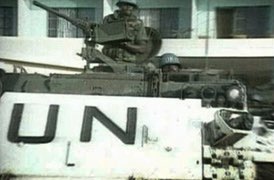Encounters with conflict and peace
The foreigners are leaving
Within a few hours, foreigners were leaving Rwanda in large numbers.
From offices, embassies, NGOs, monasteries and universities, road convoys headed for neighbouring countries. Some left by an emergency airlift. Their sudden departure was a surprise to many Rwandans, and it had an immediate effect on both victims and killers.
The UN comes... and goes
"A detachment of blue-helmeted UN soldiers in three armoured vehicles arrived in the little town (of Nyamata), visiting the church, the convent, and the maternity and general hospitals. At each stop they picked up whites – five priests and three nuns in all. Mission accomplished, the convoy turned around and swiftly vanished down the main street.
Valerie Nyirarudodo, a nurse-midwife at the Sainte-Marthe Maternity Hospital, remembers, “They pulled up in front of the gate. They told the three white sisters to pack small bags immediately. They said, ‘No point anymore in wasting time with goodbyes, right now is goodbye.’ The Swiss women asked to bring along their Tutsi colleagues in white caps. The soldiers replied, ‘No, they are Rwandan, their place is here. It is better to leave them among their brothers and sisters.’ The convoy left, followed by a van of singing interahamwe.
Of course, soon afterwards, the Tutsi sisters were cut just like the others.”
from A Time for Machetes: the Killers Speak by Jean Hatzfeld
“Whites do not want to see what they cannot believe, and they could not believe a genocide, because that is a killing that overwhelms everyone, them as much as the others. So they left."
Claudine Kayitesi. Farmer and survivor
No-one will stop us

When they saw the convoy disappear in the dust without even a little stop for curiosity or a drink on the main street, they celebrated with some Primus and shot off the cartridges in their guns as a sign of relief. You could see they felt saved. They were rid of the last stumbling block, so to speak.”
ADALBERT (a killer): "Ever since the plane crash, the radio had hammered at us, “The foreigners are departing... this time they are showing no interest in the fate of the Tutsis. We witnessed that flight of the armoured cars with our own eyes. For the first time ever, we did not feel we were under the frowning supervision of the whites."
From A time for machetes. The killers speak by Jean Hatzfeld
< previous page | next page >
In this section
STARTING A GENOCIDE
Whose idea was it?
How did it start?
The foreigners are leaving
Hate radio
DETAILS
Roadblocks
The little things
INSIGHT
A simple plan
This new job
A strangeness of mind
Personalities
A good man
FOCUS ON THE BUGESERA
The Bugesera
Ntarama church massacre
A day in the marshes
MZUNGUS
The role of the west
Two French missionaries
A journalist's story
THE END OF THE GENOCIDE
The refugee crisis
A country with nobody home

Whose idea was it?
How did it start?
The foreigners are leaving
Hate radio
DETAILS
Roadblocks
The little things
INSIGHT
A simple plan
This new job
A strangeness of mind
Personalities
A good man
FOCUS ON THE BUGESERA
The Bugesera
Ntarama church massacre
A day in the marshes
MZUNGUS
The role of the west
Two French missionaries
A journalist's story
THE END OF THE GENOCIDE
The refugee crisis
A country with nobody home

